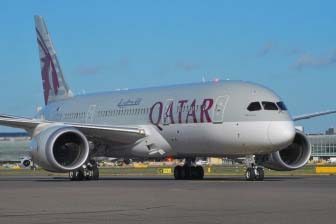
Several US air carriers have once again accused airlines based in Qatar and the UAE of unfairly competing for passengers, and are asking American politicians to restrict the Gulf carriers’ access to their market.
Criticism from the heads of US carriers is nothing new for Qatar Airways, Emirates and Etihad.
But now, American airline executives appear to be escalating matters by asking lawmakers to renegotiate the so-called open-skies agreements that the US has with Qatar, the UAE and many other countries.
“We welcome robust competition provided the playing field is level,” United, Delta and American Airlines said in similar statements to the New York Times earlier this month. “A reopening of those open-skies agreements is the first step and the right step to ensure competition is preserved and enhanced.”
Ben Hirst, Delta’s chief legal officer, added in a comment to Reuters:
“From the US airlines’ standpoint, we’re competing with (foreign) governments, not private businesses.”
Limiting access
As part of the agreement between the US and Qatar, carriers are the ones who determine the frequency and capacity of flights between the two countries.
In contrast, some governments place limits on foreign airlines. One example is Canada, which restricts Qatar Airways to three weekly flights to Montreal despite the airline’s interest in expanding service to the country.
In a joint interview with the Wall Street Journal, the heads of the big three US airlines said their Gulf counterparts had received US$42.3 billion in “quantifiable” subsidies since 2004.
That’s in addition to other benefits, such as tax exemptions, breaks on paying for airport infrastructure and anti-union laws that keep wages low.
Emirates has hit back at the accusations, with Chairman Sheikh Ahmed Bin Saeed Al Maktoum this week offering up some advice to his rivals:
“Offer the best to the passengers and people will fly with you,” he told Bloomberg.

While Qatar Airways CEO Akbar Al Baker has not publicly responded to the latest round of accusations from the US carriers, he’s previously dismissed the allegations.
“It is not true that we are subsidized,” he was quoted as saying in early 2014.
However, Qatar Airways is state-owned and does not disclose its financial results. And a promise made last May to disclose its 2013 profit figure was never fulfilled.
Opposition at home
Meanwhile, US carriers face opposition in convincing American politicians that placing new controls on the Gulf airlines is in the country’s best interests.
Consumer advocates such as the United States Travel Association have already come out against the idea, arguing that open skies agreements have made it “easier and cheaper for American citizens to travel abroad” while helping to attract more foreign tourists.

Additionally, the rapid expansion of the Gulf carriers has resulted in hundreds of orders for US-based plane manufacturing Boeing – business that could be hindered by a political dispute.
Qatar Airways alone lists 62 Boeing aircraft in its fleet, with a further 150 on order, with a combined list price in the billions of dollars.
Nevertheless, the recent lobbying effort by the US airlines is regarded as the loudest and most direct call to date for American officials to intervene and protect their airlines’ market share.
Specifically, the US carriers want the government to launch “consultations” with the UAE and Qatar to negotiate new rules that would presumably slow the Gulf carriers’ expansion into the US and hinder the growth of air travel options for residents.
Over the past few years, Qatar Airways has been expanding rapidly in the US, introducing service to Miami, Philadelphia and Dallas/Fort Worth in 2014.
The argument
To support their arguments, the US airlines have reportedly circulated a 55-page report to American lawmakers that has not been made public. However, Reuters reported that it was shown portions of the report that illustrate the shifting market dynamics.
According to the news agency, the proportion of bookings between the US and the Indian subcontinent on Delta, United and American Airlines fell from 39 percent in 2008 to 34 percent last year.

Meanwhile, the combined market share of Emirates, Etihad and Qatar Airways rose from 12 percent to 40 percent during the same time period.
So what has helped the fuel that shift?
Part of the Gulf carriers’ advantage in geography. The airlines’ hub are situated in relatively close proximity to densely populated cities, which enables favorable transfers in Doha, Dubai and Abu Dhabi for passengers.
Additionally, the Gulf airlines market themselves as luxury brands in an industry frequently perceived in recent years to offer poor customer service and passenger comfort.
Critics, however, allege that Emirates, Etihad and Qatar Airways also receive financial support from their state owners that helps enable the airlines to offer more attractive fares on certain routes.
Thoughts?







